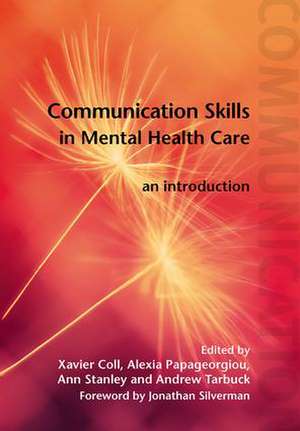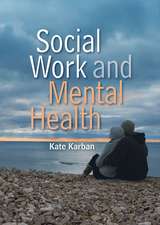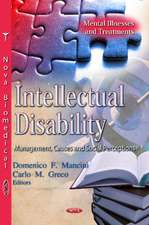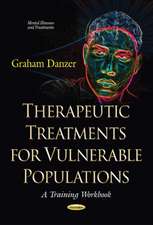Communication Skills in Mental Health Care: An Introduction
Autor Xavier Coll, Alexia Papageorgiou, Ann Stanley, Andrew Tarbucken Limba Engleză Paperback – 27 feb 2012
Preț: 276.49 lei
Preț vechi: 333.03 lei
-17% Nou
Puncte Express: 415
Preț estimativ în valută:
52.90€ • 55.39$ • 43.78£
52.90€ • 55.39$ • 43.78£
Carte tipărită la comandă
Livrare economică 05-19 aprilie
Preluare comenzi: 021 569.72.76
Specificații
ISBN-13: 9781846195167
ISBN-10: 1846195160
Pagini: 194
Dimensiuni: 174 x 246 x 15 mm
Greutate: 0.36 kg
Ediția:1
Editura: Not Avail
Colecția CRC Press
Locul publicării:Oxford, United Kingdom
ISBN-10: 1846195160
Pagini: 194
Dimensiuni: 174 x 246 x 15 mm
Greutate: 0.36 kg
Ediția:1
Editura: Not Avail
Colecția CRC Press
Locul publicării:Oxford, United Kingdom
Public țintă
GeneralCuprins
Foreword. Preface. About this book. About the editors. List of contributors. Acknowledgements. List of figures and tables. 1 Introduction. Why is teaching and learning communication skills in mental health important? Communication skills training for mental health professionals. The way forward. References. 2 Taking a good psychiatric history. Learning outcomes. The purpose of the psychiatric history. The psychiatric history compared with a medical history. Gathering a psychiatric history. Eliciting a psychiatric history. The mental state examination. The domains of the mental state examination. References. 3 Mental health assessment of anxiety and depression. Learning outcomes. Introduction. Depression. Anxiety disorders. The overlap between symptoms of depression and anxiety. Scenario. Skills for you to apply. Top tips. Further reading. 4 Assessing risk to self: suicide and self-harm. Learning outcomes. Introduction. Skills for you to apply. Assessment of self-harm. Scenario 1: Assessment of self-harm. Scenario 2: Assessment of suicide. Skills for you to apply. Further reading. 5 Information gathering in psychosis. Learning outcomes. Introduction. Skills for you to apply. How to do it. References. 6 Information giving and shared decision making in psychosis. Learning outcomes. Introduction. Skills for you to apply. 7 Working with families and young people. Learning outcomes. Introduction. Skills for you to apply. Scenario. How to do it. References. Further reading. 8 Assessment of mental capacity. Learning outcomes. Introduction. Skills for you to apply. Scenario. How to do it. References. Further reading. 9 Dealing with emotions. Learning outcomes. Introduction. Dealing with emotions: general principles. Skills for you to apply. Scenario 1: Anger. Scenario 2: Distress. Dealing with extremes of emotion. Dealing with our own emotions. References. Further reading. 10 Breaking bad news in mental health. Learning outcomes. Introduction. Skills for you to apply. Scenario. How to do it. References. Further reading. 11 Mental health consultations in primary care: managing the 'heartsink patient'. Learning outcomes. Introduction. Why is it important to understand communication skills for dealing with the 'heartsink patient'? Who is the 'heartsink patient'? So why does the clinician's heart sink when these patients' names appear on the list for the day's consultations? Special considerations for this topic. Skills for you to apply. Scenario. Key tasks. References. Further reading. Appendix 1: Calgary-Cambridge Guides. Appendix 2: The psychiatric history. Appendix 3: The HEEAADSSS + ICE protocol. Appendix 4: Family tree (pedigree diagram for Kevin's family history). Appendix 5: How to pass communication skills OSCEs in mental health. Appendix 6: Example of OSCE mark sheets in mental health. Appendix 7: OSCE model answers. Index.
Notă biografică
Xavier Coll, Alexia Papageorgiou, Ann Stanley, Andrew Tarbuck
Descriere
This book provides a clear and concise guide on how to run consultations, using the Calgary-Cambridge Model. It focuses on a variety of mental health conditions, ranging from taking a good psychiatric history to specialist scenarios such as working with families and young people or breaking bad news.














